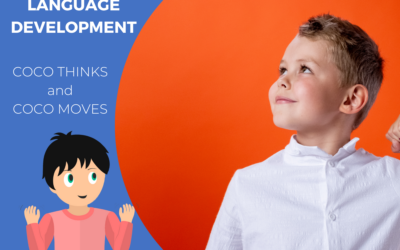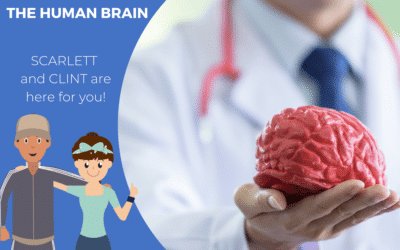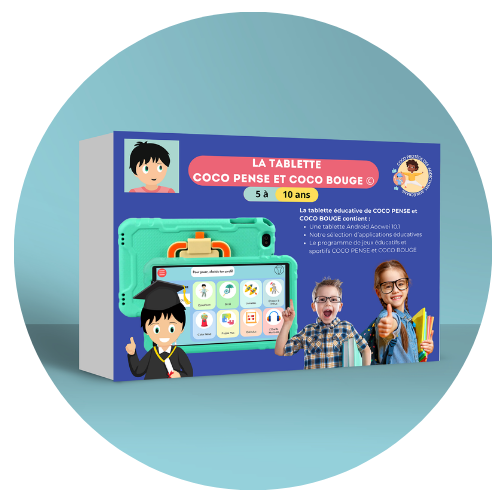The use of the electronic tablet for people with autism
Autism is a developmental disorder that can affect 1-2 out of every 1000 children. People with autism sometimes express their anxieties through anger or aggression. The use of the electronic tablet will promote their progress in communication, autonomy, learning, etc.
There is more to caring for someone with autism than just therapy. It is also necessary to adapt the environment and choose the most suitable tools. Indeed, it is important to apply the strategies learned during the sessions in everyday life.
Healthcare professionals can help you choose the best tools. Each person is different, so tools must be chosen according to the individual’s difficulties and skills.
Autism in children
The development of children with autism is unique. For them communication, emotions, play and relationships are difficult to manage and understand. It is important for them to be in a known environment without too many variables to manage. The tablet can help them understand their needs, skills and vulnerabilities.
The tablet thus becomes the safe place where the child can develop at his own pace. In addition, with adapted applications, the child can learn new strategies to overcome his difficulties.
Supporting children with autism
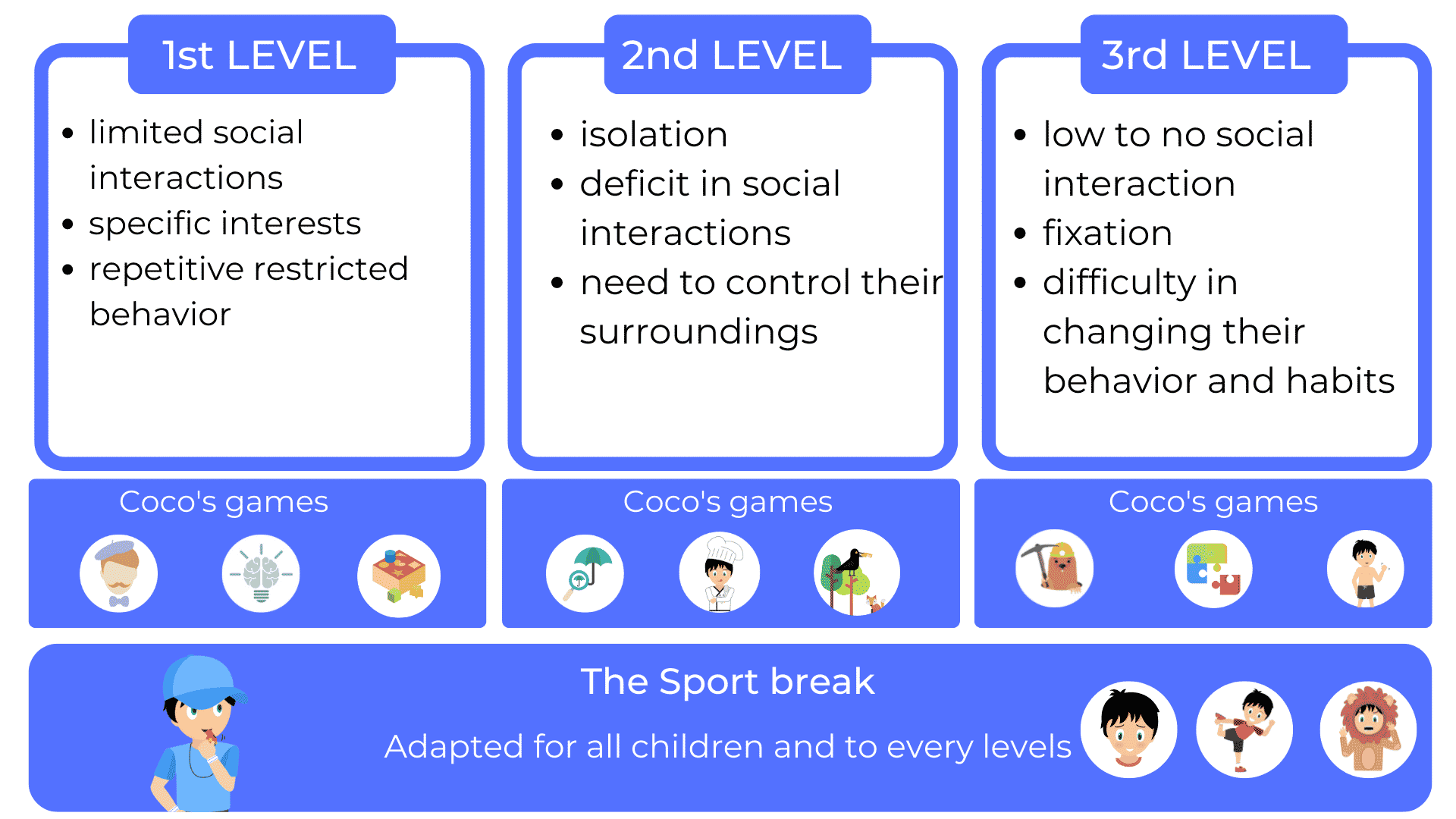
Autism in adults
By the time an autistic person becomes an adult, he or she has already learned strategies or how to manage emotions and behaviors. On the other hand, sometimes a person may discover that they have autism as an adult. In both cases, the objective is to maintain the person’s autonomy. For adults with autism the main difficulties are in relationships and communication.
The tablet can become a mediation tool, allowing the person to communicate with others or share an activity or game.
Signs of autism in adults
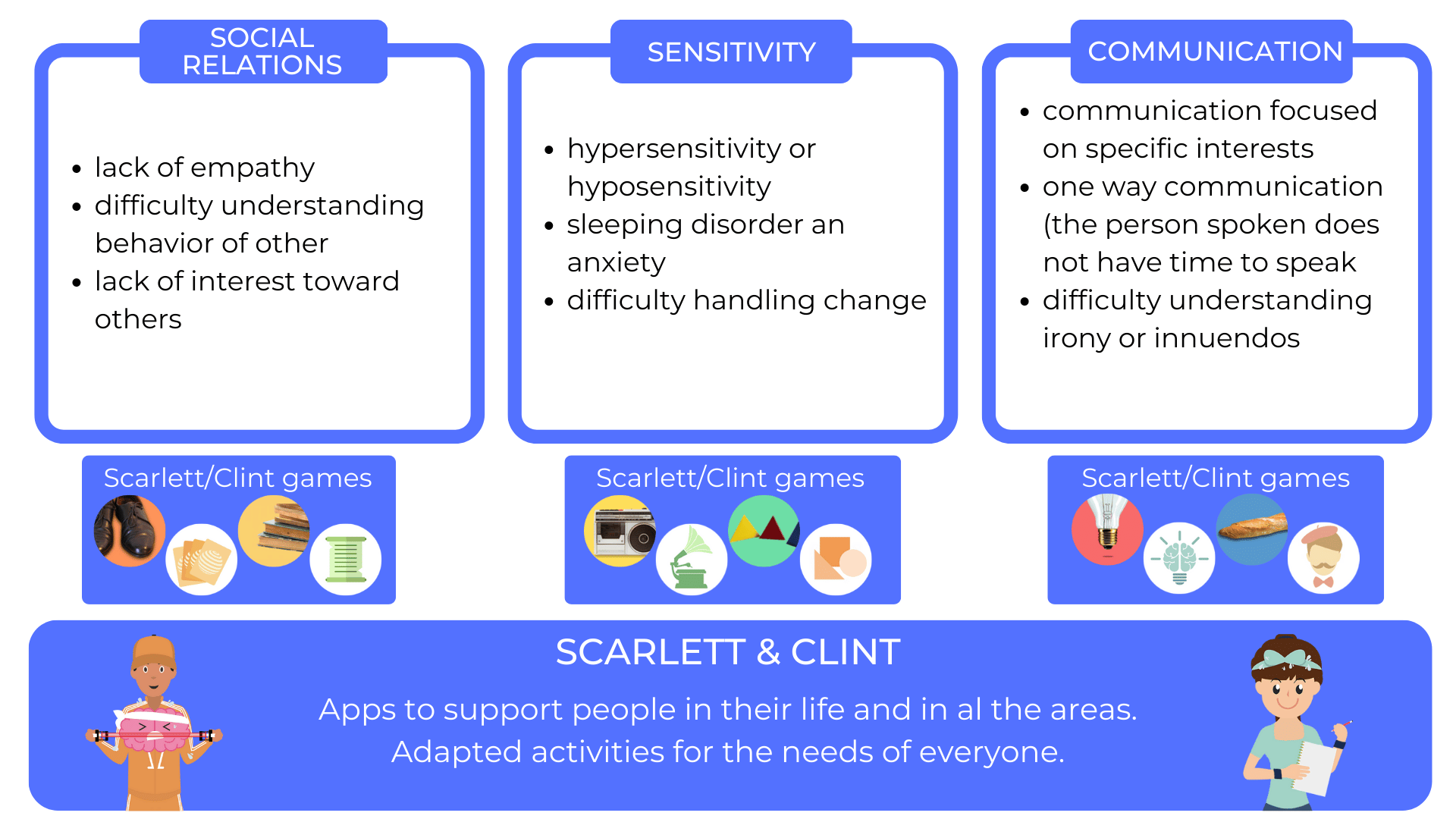
What can a tablet do for autism?
New technologies can help people with Autism Spectrum Disorders to thrive. This is the case of the electronic tablet.
What are tablets?
Today, the electronic tablet has changed the habits within families. For people with autism spectrum disorder, it is an effective way to overcome communication difficulties. The tablets exhibit a touch interface. Their size can vary according to the dimensions of the screen. The individual with autism is able to grasp his or her tablet with both hands. Touchscreens can be adapted to the visual abilities of people with autism.
In addition to touch controls, a tablet uses applications, image and sound sensors. Like a computer, a tablet has the ability to run software applications. There are applications that meet the needs of autistic people. Some are free, others you have to pay for. The tablet is often equipped with a camera and a microphone. This is useful for capturing interesting moments in life.
Specific functions for people with autism
Fortunately, manufacturers have thought about people with disabilities by providing them with specific features. This allows people with autism to use the tablet appropriately. First of all, we distinguish functions to help with communication. This is possible thanks to software applications aimed at improving with autistic adults or children. For example, they use images and pictograms.
Another interesting element for children with autism is the learning function. Certainly, people with autism have the opportunity to learn many concepts from the tablet computer. These include learning shapes, colors, exercises and many others. In addition, with an Internet connection, you can look for a lot of thins that will help broaden their knowledge.
Why use a tablet?
Various arguments are used to convince professionals or parents who care for an autistic person. Here are our three reasons to use a tablet to help with autism.
To promote communication
Autism is considered a developmental disorder. The difficulties are manifested in the social relationship. According to specialists, communication develops late in a person with autism. A professional who deals with autistic children or parents need efficient tools to help them communicate. Specific support is needed to enable them to communicate better.
In this case, the electronic tablet is an ideal tool, whether used by a professional or a parent. You will be able to work with the autistic person through communication tools delevoped specifically to do so.
To develop your autonomy
The use of the electronic tablet can be beneficial in this regard. This establishes a routine. There is also the fact that people with autism show autonomy in choosing activities, games, videos, etc. It should be noted that autonomy is difficult to acquire in individuals with autism. However, the electronic tablet can add its own touch.
There are several barriers to independence for people with autism. Autism affects the functions necessary for ASD people to accomplish daily tasks alone. The use of visual aids is a good way to develop autonomy for people with autism.
To facilitate learning
People with autism are at risk for learning disabilities. It is therefore necessary to provide them with devices to promote better learning. The tablet can help develop new skills. Children with autism will be able to learn visually. Moreover, with the tablet, the autistic person can better understand concepts.
The use of the electronic tablet also helps to develop concentration. This can be seen in the activities. Setting up a means of communication, learning and concentration is vital for all people with autism. In fact, they communicate in different ways.
Tips for better tablet use in individuals with autism
The electronic tablet is proving useful in opening up a child with autism to the world. Each progress is a victory. For adults, the tablet can be a mediation tool to interact with their environment and others. Some tips to get started with these latest generation tool.
Select the right applications
The tablet allows individuals with autism to have some autonomy or independence. Touchpads are very in, and there are many different kinds. Plus, it’s not always easy to find your way through this array of autism applications. You will achieve this by taking into consideration different criteria. Check the following items when purchasing software. It is about the configuration, its accessibility and its suitability. Whatever its price, the application must be able to meet specific expectations for autistic people.
The goal of the apps is to restore confidence to individuals prone to autism spectrum disorders (ASD). It is essential to communicate with people and to learn things. We will think about all these parameters during the choice of the applications. Some websites list popular autism apps.
Here’s our advice
Which tablet should I choose? Choose a suitable model. This involves choosing the size that seems to fit. For example, a small tablet is intended to be lighter than a large one. You don’t necessarily need a device with a large memory capacity. Mostly apps for autism are not too heavy.
However, mastering the tool or applications may require the help of a companion. Think about it! This help will give you tips on how to get started with a tablet computer.
COCO THINKS and COCO MOVES
COCO THINKS and COCO MOVES is an application of educational and sports games for children. The activities are adapted and follow the learning stages of the children. Children with autism learn and develop at their own pace. This application offers several different games and three levels of difficulty. Each child can find the right activity for him/her.
The game screens are uncluttered and the elements present are limited. This way, the child has fewer variables to deal with and can play with peace of mind.
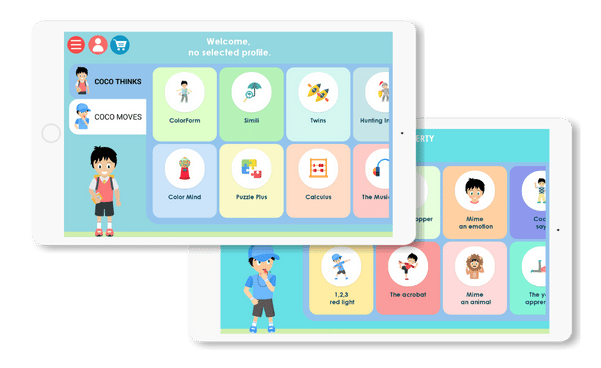
In the proposed activities there are also less physical activities, like the game “Mime an emotion”. This game allows the child to learn to recognize the emotions on himself and on others.
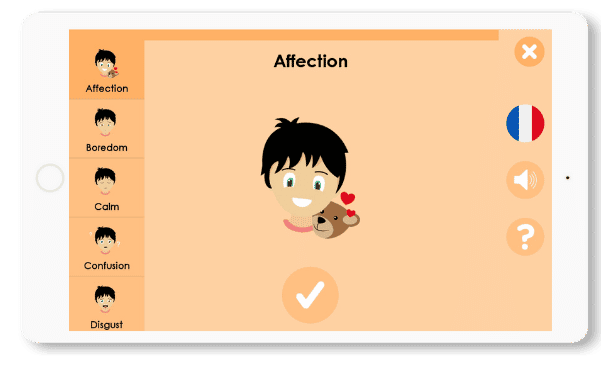
Clint, you brain coach
Clint is a cognitive and cultural game application for adults who want to improve their cognitive functions. Adults with autism can use it to improve their skills or to share activities with their loved ones. The activities are varied and therefore stimulate language, memory, attention and logic.
In addition, cultural activities help to broaden general knowledge and better understand the environment in which we live.
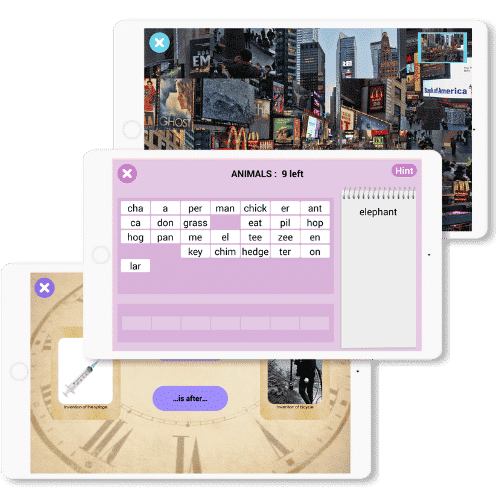
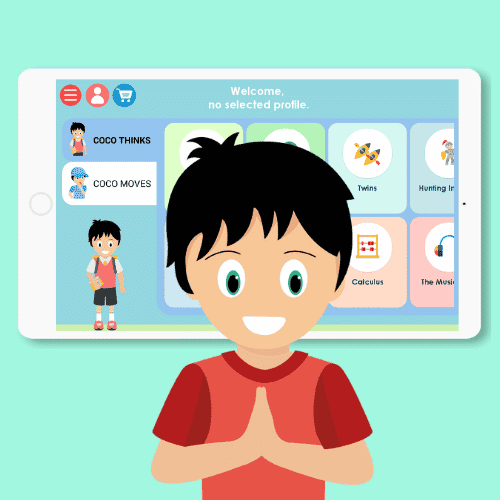
COCO THINKS and COCO MOVES
+30 educational and sports games for children
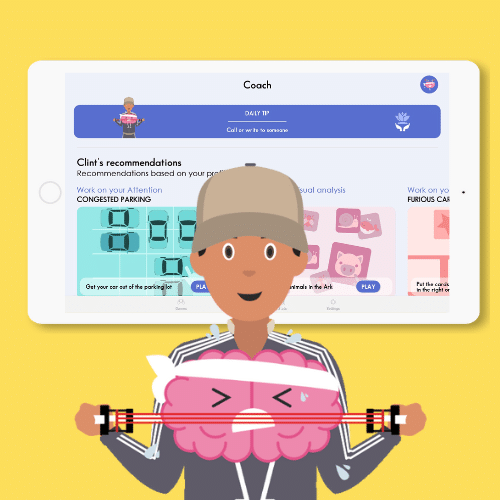
CLINT
+30 cognitive and cultural games for adults
Other articles that might interest you:
Supporting children with autism
Dynseo proposesSUPPORTING CHILDREN WITH AUTISM with COCO THINKS AND COCO MOVESDynseo and its team are very much...
Supporting DYS children with COCO THINKS and COCO MOVES
Dynseo proposesDYS disorders with COCO THINKS and COCO MOVESOur educational and pedagogical games program COCO THINKS...
Language development
Children communicate from birth with movements, crying, looking at each other or with smiles. After only a few months,...
Supporting children with Down Syndrome with Coco
Dynseo proposesDOWN SYNDROME with COCODown syndrome is a non-hereditary chromosomal abnormality that leads to the...
Supporting people after a stroke
Dynseo proposesStroke with CLINT, your brain training coachThe Dynseo team is very involved in helping people who have...
Supporting someone with Alzheimer’s
In this guide, we will detail how SCARLETT can be used for supporting someone with Alzheimer's. SCARLETT is a...
10 myths about the human brain you didn’t know
The brain is an incredible muscle, however there are many things we do not know, and what we do know is not always...
Using Digital Tools to Support Students with Special Educational Needs
Special Educational Needs (SEN) encompass a wide range of learning difficulties and disabilities that can hinder a...
Down Syndrome and Communication: Facilitating Interaction with Visual and Interactive Supports
When we think about Down syndrome, we often recognize it as a genetic condition that affects physical and cognitive...
How to Track Progress in People with Down Syndrome Using Digital Tools
Down syndrome, a genetic condition caused by the presence of an extra chromosome 21, affects approximately 1 in every...




